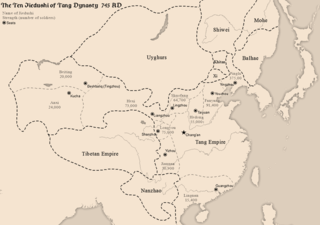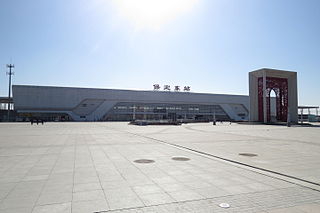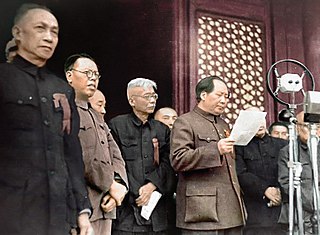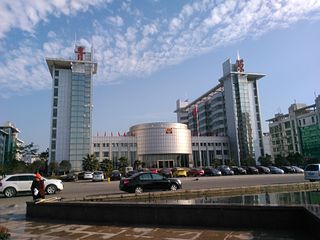Related Research Articles

The jiedushi or jiedu, was a regional military governor in China; the title was established in the Tang dynasty and abolished in the Yuan dynasty. The post of jiedushi has been translated as "military commissioner", "legate", or "regional commander". Originally introduced in 711 to counter external threats, the jiedushi were posts authorized with the supervision of a defense command often encompassing several prefectures, the ability to maintain their own armies, collect taxes and promote and appoint subordinates.

The People's Republic of China competed at the 1984 Summer Olympics in Los Angeles, United States. It was the first appearance at the Summer Games for the country after its mostly symbolic presence at the Summer Games in 1952 during which the dispute between the Republic of China and the PRC resulted in the former withdrawing all its athletes. After 1952 and until these games, the PRC boycotted the Olympics due to the Taiwan's presence as the Republic of China. In 1984, the Republic of China competed as Chinese Taipei and the PRC competed as China. Due to the then ongoing Sino-Soviet split, China did not participate in the Soviet-led boycott. In the previous games, China participated the United States-led boycott to protest the Soviet invasion of Afghanistan in 1979.

The People's Republic of China competed at the 1988 Summer Olympics in Seoul, South Korea. 273 competitors, 149 men and 124 women, took part in 150 events in 25 sports.

Qingyuan, formerly romanized as Tsingyun, is a prefecture-level city in northern Guangdong province, China, on the banks of the Bei or North River. During the 2020 census, its total population was 3,969,473, out of whom 1,738,424 lived in the built-up area made of urbanized Qingcheng and Qingxin districts. The primary spoken language is Cantonese. Covering 19,015 km2 (7,342 sq mi), Qingyuan is Guangdong's largest prefecture-level division by land area, and it borders Guangzhou and Foshan to the south, Shaoguan to the east and northeast, Zhaoqing to the south and southwest, and Hunan province and Guangxi Zhuang Autonomous Region to the north. The urban core is surrounded by mountainous areas but is directly connected with Guangzhou and the Pearl River Delta by Highway 107.
Liu Yin (劉隱), formally Prince Xiang of Nanhai (南海襄王), later further posthumously honored Emperor Xiang (襄皇帝) with the temple name of Liezong (烈宗) by his younger brother Liu Yan, was a warlord late in the Chinese Tang dynasty and Tang's succeeding dynasty Later Liang of the Five Dynasties and Ten Kingdoms period, who ruled Qinghai Circuit as its military governor (Jiedushi). It was on the basis of his rule that Liu Yan was later able to establish the state of Southern Han.

Qingyuan is a district of the city of Baoding, in the central part of Hebei province, China, covering part of the southern and eastern suburbs of Baoding. As of 2006, it has a total population of 620,000 residing in an area of 953 km2 (368 sq mi).

Qingyuan Xingsi was a Zen Buddhist monk during the Tang dynasty. Three of the five traditionally recognized houses of Zen are commonly believed to have developed out of his lineage: the Caodong/Sōtō, Yunmen/Unmon, and Fayan/Hōgen. There is scant information about his life. He is said to have lived in the Quiet Abode Temple on Mount Qingyuan. The Transmission of the Lamp claims he was Huineng's foremost student, although this was written during the Song dynasty over 200 years after Qingyuan's death. In fact, in the oldest version of the Platform Sutra found among the Dunhuang manuscripts, which dates to about 850 CE, Qingyuan is not listed as a student of Huineng at all. The earliest source of information about Qingyuan comes from the Anthology of the Patriarchal Hall, which was completed in 952 by the monk Wendeng. The scholar Albert Welter suggests that Wendeng may have invented Qingyuan in order to legitimize Shitou Xiqian, Qingyuan's supposed student, and in turn himself since he was descended from Shitou. Shitou's original teacher, Huineng, died when Shitou was only 13, so Qingyuan was necessary for him to receive legitimate dharma transmission.

The Futian incident is the common title for the December 1930 purge of a battalion of the Jiangxi-Fujian Soviet's "Red Army" at Futian. The Futian battalion's leaders had mutinied against Mao Zedong's purge of the Jiangxi Action Committee, ordered on the pretext of its alleged connection to the Anti-Bolshevik League and ties to Trotskyism.

Qingyuan is a district in the municipal region of Ji'an, Jiangxi province, People's Republic of China. Qingyuan comprises the right (east) bank of the Gan River opposite the Ji'an municipal government centre, and stretches southeast in a rather narrow strip of territory up to Mount Dawu on the border with Ganzhou Municipality.

Qingcheng is a district of Qingyuan, Guangdong province, China.

Qingyuan railway station is a railway station located in Qingcheng District, Qingyuan, Guangdong, China. On the Wuhan–Guangzhou High-Speed Railway, it is served by 300 km/h (190 mph) high speed trains.

The Water Margin is a 1998 Chinese television series adapted from Shi Nai'an's classical 14th-century novel of the same title. It was produced by CCTV with Zhang Jizhong as producer. It was first broadcast in China in January 1998. The series also featured action choreography by Yuen Woo-ping.

Zhu Yuling is a Chinese table tennis player representing Macau.

Zhu Ting is a professional Chinese volleyball player. She is an outside hitter and former captain of the China women's national volleyball team. Currently, she plays for Italian club Imoco Volley Conegliano.

Guangzhou–Qingyuan intercity railway, also known as the Guangqing intercity railway, is a regional rail within Guangdong province, China. It will connect the provincial capital Guangzhou with Qingyuan. It is a part of the Pearl River Delta Metropolitan Region intercity railway system. It will be built with an operating top speed of 200 km/h (124 mph).
Events from the year 1982 in China.

Jingju Temple is a Buddhist temple located on Mount Qingyuan, in Qingyuan District of Ji'an, Jiangxi, China.

Qingyuan Maglev Tourist Line is a medium-low speed maglev line under construction in Qingyuan, Guangdong province, China.

Qingyuan, also called QYEV, is a Chinese automobile manufacturer headquartered in Tianjin, China, that specializes in producing electric vehicles.

The Bond is a 2021 Chinese drama television series based on Wei Xi's novel of the same name, directed by Zhang Kaizhou and starring Bai Yu, Zhang Wanyi, Mao Xiaotong, Song Zu'er and Zhou Yiran. The series airs on Zhejiang TV, Jiangsu TV and Tencent Video from August 17 to September 8, 2021. The series received mainly positive reviews, Douban gave the drama 7.7 out of 10.
References
- ↑ "Zhu Qingyuan Olympic Results". sports-reference.com. Archived from the original on 18 April 2020. Retrieved 28 April 2011.